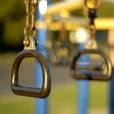Admit it: at one time or another you've probably (at least in your head) made fun of that guy at your gym who does nothing but bench press. You know, the monosyllabic-looking fellow who's so puffed up in the chest it looks like he can't put his arms down. That beefed-up appearance is known to exercise professionals as internal rotation, where the arms turn inward at the shoulders, causing the palms of the hands to face backward, gorilla-like.
What you might not know is that there's no missing link between you and this ape---most of us suffer this affliction to some degree. A consequence of hunching over our computer screens and steering wheels, internal rotation is characterized by tight chest muscles and forward-rounding shoulders. Men in particular, those who exercise only the "glamour muscles" (courtesy of Dennis on It's Always Sunny in Philadelphia) such as the chest, lats, and biceps may end up with this appearance.
Aside from looking like a primate, this kind of muscle imbalance commonly results in neck pain and headaches. No one wants that. So how can you tell if it's happening to you?
Try the pencil test: stand facing a mirror with a pencil in each fist and arms at your sides. If the pencils point straight forward, you're good. If the pencils point inward toward your thighs, then you have internal rotation. To correct it, spend time stretching your chest muscles (ask a trainer for technique) as well as strengthening your upper back with rows. The seated row is great for beginners; even better is the inverted row (put the bar of the Smith machine to chest or waist height, hang under it with body in a straight line, and pull your chest to the bar, like a horizontal pull up) or dumbbell iso-row.
And to all you bench-press devotees, I hate to be the bearer of bad news, but you'll need to lay off the chest workouts for a few weeks (think 4-8) while you focus on strengthening your upper back. The good news? Get these antagonist muscle groups into better balance, and you should be stronger at pressing exercises when you resume them.
Subscribe to:
Post Comments (Atom)

No comments:
Post a Comment